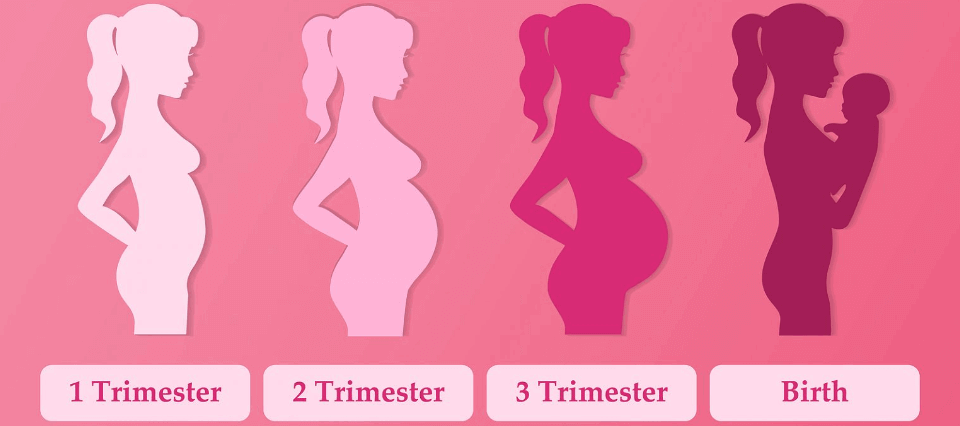First Trimester of Pregnancy | Nurturing the Beginning

First Trimester of Pregnancy: Nurturing the Beginning
Essential Aids for a Healthy First Trimester
This is the first part of a three part series on the three stages of pregnancy.
The first trimester of pregnancy marks the beginning of an extraordinary journey for both the baby and the mother. It is a critical period filled with rapid changes and development. This part of the series is dedicated provides essential aids and support for pregnant women during this early stage of pregnancy:
1, Prenatal Vitamins for Optimal Nutrition:
Maintaining a well-balanced diet is essential during pregnancy, but achieving the required level of nutrients solely through food can sometimes be challenging. Prenatal vitamins are specifically designed to bridge these nutritional gaps. These supplements are packed with critical nutrients such as folic acid, which plays a key role in preventing neural tube defects in the developing fetus. Iron is included to prevent anemia, a common issue during pregnancy that can cause fatigue and complications during delivery. Calcium is crucial for the proper development of baby's bones and teeth, while DHA, an omega-3 fatty acid, supports brain and eye development. Together, these nutrients ensure comprehensive support for the overall well-being and health of the expectant mother and the developing baby. Regular intake of these vitamins, as recommended by a healthcare provider, helps ensure that nutritional deficiencies are effectively addressed, providing a robust foundation for fetal growth and maternal health.
2. Alleviating Morning Sickness:
Morning sickness is a prevalent issue during the first trimester and can significantly impact a woman's daily life and well-being. To manage and alleviate this discomfort, several strategies can be effective. Natural remedies such as ginger tea are widely recognized for their anti-nausea properties and can provide quick relief. Acupressure bands, worn on the wrist, work by applying continuous pressure to specific points known to reduce feelings of nausea. Additionally, dietary adjustments play a crucial role in managing morning sickness. Eating small, frequent meals rather than three large ones throughout the day helps maintain stable blood sugar levels, which can prevent the onset of nausea. Foods that are bland and easy to digest are ideal, as they are less likely to irritate the stomach. Avoiding rich, fatty, or spicy foods, which can exacerbate nausea, is also advised. Staying hydrated is equally important, as dehydration can worsen nausea symptoms. These combined approaches can help mitigate the effects of morning sickness, improving comfort and the overall pregnancy experience for many women.
3. Prenatal Exercise for a Healthy Body and Mind:
Staying active during pregnancy is immensely beneficial, not just for physical health but also for mental well-being. Gentle exercises that are specifically designed for expectant mothers, such as prenatal yoga and swimming, offer safe ways to stay fit and promote good circulation, which is essential for preventing common pregnancy-related issues like swelling and varicose veins. Regular physical activity helps to enhance the flexibility and endurance needed for labor and delivery. Moreover, exercise releases endorphins, often referred to as 'feel-good' hormones, which can significantly boost mood and energy levels, helping to alleviate symptoms of depression and anxiety that can sometimes occur during pregnancy. Additionally, exercises like swimming can feel especially soothing as the water supports body weight, reducing the strain on joints and muscles and providing a welcome relief from the added weight of pregnancy.
First pregnancy? Invest in a body pillow built to last - through every stage and every pregnancy.
4. Nurturing Emotional Well-being:
Pregnancy is a profound journey that brings a whirlwind of emotions, from joy and excitement to anxiety and fear. It is essential for expectant mothers to receive ample emotional support during this transformative period. Encouraging them to engage with a supportive network, whether it’s through close friends, family members, or prenatal support groups, can make a significant difference in their mental health. These support systems offer a safe space to share experiences, fears, and joys, which can alleviate feelings of isolation and stress. Participating in group activities like prenatal classes also helps in building connections with other women going through similar experiences, fostering a sense of community and camaraderie. This interaction provides not only emotional comfort but also practical insights and advice on handling the challenges of pregnancy. Additionally, expectant mothers should be encouraged to seek professional help if they experience persistent sadness or anxiety, as these could be signs of prenatal depression or anxiety disorders, which are treatable with the right professional care. Ensuring emotional stability during pregnancy is crucial, as it directly impacts the psychological and physical health of both the mother and the baby.
5. Adequate Rest and Sleep:
It is vital to remind pregnant women about the importance of obtaining sufficient rest and quality sleep during the first trimester. As the body undergoes significant changes to accommodate the developing baby, the need for rest becomes crucial. The production of pregnancy hormones, the increase in blood volume, and the energy used in building the placenta can lead to increased fatigue. Ensuring adequate sleep is essential not only for the physical health of the mother but also for emotional and mental well-being. Good sleep helps to manage stress levels, maintain a healthy blood pressure, and support the immune system, which is particularly important during pregnancy.
Pregnant women should aim for 7-9 hours of uninterrupted sleep each night. Creating a comfortable sleeping environment can also significantly improve sleep quality. This might include using supportive pillows to relieve pressure on the back and hips, maintaining a cool room temperature, and limiting exposure to blue light from screens before bedtime. Additionally, if finding a comfortable sleeping position becomes challenging, especially later in the first trimester, maternity pillows can be used to provide extra support around the abdomen and legs. Encouraging short, restful naps during the day can also help compensate for any lost sleep at night and reduce overall fatigue. All these measures contribute to the overall health of the pregnancy and can help prepare the body for the demands of the coming trimesters.
6. Managing Stress and Anxiety:
Pregnancy can bring about significant emotional changes, making it a potentially stressful and anxious time. Managing these feelings is crucial for both the mother's and the baby's well-being. Women are encouraged to practice relaxation techniques such as mindfulness meditation or deep breathing exercises, which have been shown to effectively reduce stress and promote calm. These practices not only help in managing anxiety but also improve sleep quality and decrease the risk of prenatal depression. Creating a calming environment at home, such as setting aside a quiet space for relaxation and limiting disturbances, can also significantly enhance the pregnancy experience. Light activities such as reading, listening to soothing music, or spending time in nature can also be beneficial. It’s important for expectant mothers to communicate their needs to their support system, ensuring they receive the emotional backing they need during this transformative period.
7. Hydration:
The importance of staying hydrated cannot be overstressed during pregnancy. Water plays a crucial role in almost every aspect of bodily function, including digestion, nutrient transport, and regulation of body temperature. Adequate hydration is essential for maintaining healthy levels of amniotic fluid, which is critical for the protection and development of the baby. Pregnant women should aim to drink at least eight to ten glasses of water a day, possibly more if they are active or if the weather is warm. Symptoms of dehydration to watch for include headaches, nausea, and dizziness. Keeping a water bottle handy at all times is a practical tip that can help achieve daily water intake goals. Additionally, incorporating fruits and vegetables with high water content into the diet can aid in maintaining hydration levels.
8. Avoid Harmful Substances:
During pregnancy, it is vital to avoid substances that could pose risks to the developing baby. Alcohol, tobacco, and certain medications can interfere with fetal development and result in adverse outcomes such as birth defects, developmental delays, and other serious health issues. Pregnant women should be fully informed about the dangers of these substances and the importance of avoiding them. It’s also essential to review any medications, including over-the-counter and herbal supplements, with a healthcare provider to ensure they are safe to use during pregnancy. Healthcare providers can offer guidance on safe alternatives and help manage any existing health conditions in a way that protects both mother and baby. Ensuring that expectant mothers have access to accurate information and supportive care can help prevent potential harm and promote a healthy pregnancy.
Special Considerations for the First Trimester
Beyond general tips, there are specific areas that require attention during the first trimester to ensure the health and safety of both the mother and the developing baby:
-
Routine Medical Tests: Early screenings and tests are vital for monitoring health and development. These include blood tests, ultrasounds, and possibly genetic testing, depending on individual risk factors.
-
Nutritional Adjustments: Morning sickness may hinder eating habits. Foods rich in vitamin B6, like bananas and nuts, can alleviate nausea. Small, frequent meals and avoiding overly spicy or odorous foods can also help.
-
Safety in Supplements and Medications: Not all medications and supplements are safe during pregnancy. Consulting with a healthcare provider is crucial before starting any new regimen.
-
Environmental and Occupational Hazards: Minimizing exposure to harmful substances at home and work is important. Discussing accommodations with employers can also be crucial for safety.
-
Emotional and Psychological Well-being: Managing emotional changes with support from healthcare providers, mental health professionals, or support groups is beneficial for maintaining mental health during this transformative period.
Further Reading:
Part Two: Blossoming into Maternity: Essential Aids for the Transformative Second Trimester
Part Three: Nurturing the Journey's End: Essential Aids for the Fulfilling Third Trimester
Pregnancy Stages - Image Credit Beaumont Hospital

















